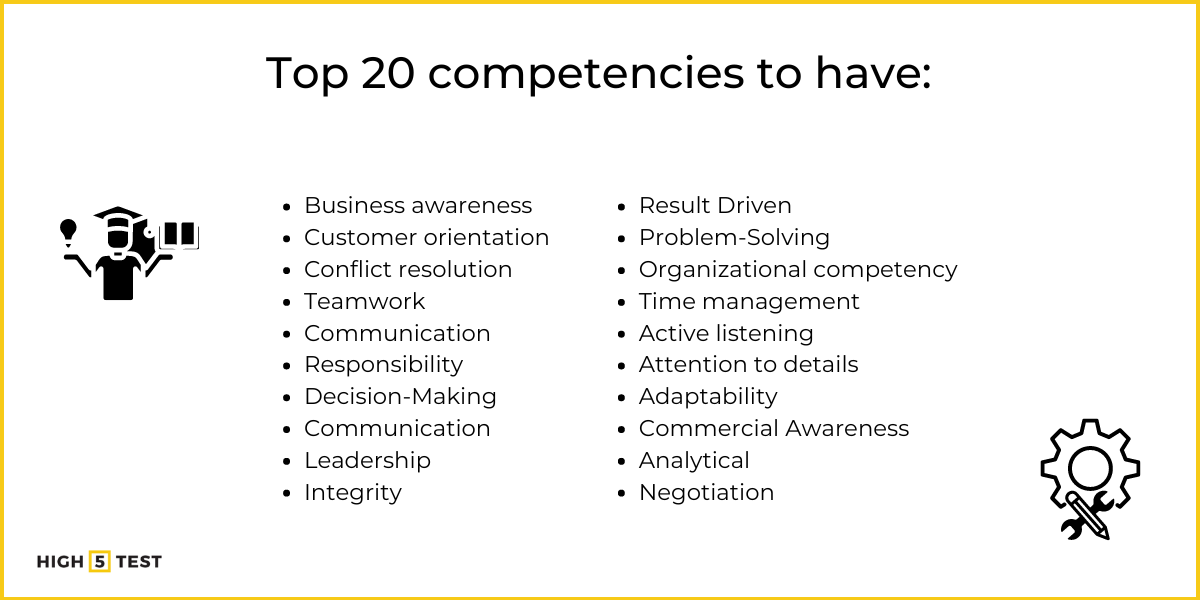Understanding your competencies is crucial for showcasing the knowledge and skills that employers seek. These inner abilities and outer skills, gained through experience, education, and training, form the foundation of your professional profile. To gain a comprehensive understanding of your unique competencies, consider taking the HIGH5 strengths assessment. This powerful tool not only identifies your top strengths but also provides insights into how these strengths translate into valuable competencies that can set you apart in the job market.
By leveraging the HIGH5 test, you can present a more compelling and evidence-based picture of your capabilities to potential employers. They provide an objective view of how your capabilities meet employers’ needs, such as financial, educational, environmental, learning and training organizations. In this article, I will speak about core competencies that you must have in your personal and private life to become the best version of yourself. Let’s get started.
What are competencies?
Competencies are the abilities, skills, knowledge, and behaviors that lead to successful performance. They encompass a range of abilities and characteristics that enable individuals to perform tasks effectively within a specific context or workplace. The HIGH5 strengths test is valuable for individuals and organizations looking to harness their natural talents for enhanced personal satisfaction, professional development, and team effectiveness. It excels in competency development, helping individuals understand and leverage their strengths to excel in communication, leadership, and teamwork, which are crucial for success in any professional environment.
Pro Tip From HIGH5
Directly after introducing the concept of competencies, suggest taking the HIGH5 strengths test to help individuals identify their top strengths. This can be useful for understanding which competencies they naturally excel in and how to develop these areas further.
Competency is an ability to carry out the task and knowledge of methods and techniques, transforming inputs into desired results through human activities. Employers who want to bring about change or achieve operational excellence must work on developing their competencies. It’s important to remember that competency has nothing to do with personality or attitude; technical know-how will help you improve performance. Competency is an important element in the process of Human Resources Management. It refers to the ability of managers, employees, and other professionals to carry out tasks successfully.

Competencies are personal skills and knowledge that form the bedrock of your capabilities. They offer an objective lens through which employers can assess how well your qualifications align with their needs, whether in financial, educational, environmental, or training sectors. To gain a clearer picture of your unique competencies, the HIGH5 strengths assessment proves invaluable. This scientifically-backed tool goes beyond surface-level skills, delving into your innate strengths and how they manifest as competencies.
By understanding your strengths through HIGH5, you can articulate your competencies more effectively to potential employers, demonstrating not just what you can do, but how your natural talents drive your performance in ways that precisely match organizational needs. Competencies describe what people can do and their demonstrated capacity or performance level in carrying out defined activities or roles: ‘what they do (behavior), ‘how well they do it (capability), and ‘how often they have done this (performance). Above all else, Competencies define the core areas that each employee must excel at for an organization to be successful.
Pro Tip From HIGH5
Leverage your HIGH5 strengths report to identify your top competencies. For each strength identified, consider how it translates into specific competencies valued in your field. This approach will help you articulate your unique value proposition more effectively to potential employers.
Importance of knowing and developing your competencies
Recognizing and nurturing your essential competencies is crucial for excelling in your current role and positioning yourself for career advancement. For ambitious individuals aiming to climb the career ladder swiftly, understanding these competencies becomes even more critical. This is where the HIGH5 strengths-based assessment proves invaluable. By identifying your top five strengths, HIGH5 provides a foundation for understanding your natural competencies. Armed with this knowledge, you can focus on developing and leveraging these strengths in your work, leading to improved performance and increased recognition.
Moreover, the insights from HIGH5 can guide your professional development efforts, ensuring you’re investing time and energy in areas where you have the greatest potential for growth and impact. Identifying these competencies will also allow you to develop a plan that will hone them over time through formal training and on-the-job experiences. Developing essential competencies can be an extremely challenging task if you are not sure where to start. For instance, do you know what your most crucial personal and professional competencies are?
As employers seek more skilled individuals to stay ahead of the competition in this fast-paced world, it becomes increasingly important to know what is required to meet their needs. Employers will ask questions like “What can you bring to my organization?” or “How good are you at doing XYZ?”. Competency-based questions require specific skills-based examples that can be used as effective answers even though they may seem difficult to answer at first glance.
Pro Tip From HIGH5
After taking the HIGH5 test, create a development plan that aligns your identified strengths with the competencies most valued in your field or desired role. This targeted approach to competency development can accelerate your career progression and help you stand out in your organization.
Top 20 competencies to have and mention in your job interview or CV
- Business awareness
- Customer orientation
- Conflict resolution
- Teamwork
- Communication
- Responsibility
- Decision-Making
- Communication
- Leadership
- Integrity
- Result Driven
- Problem-Solving
- Organizational Competency
- Time management
- Active listening
- Attention to details
- Adaptability
- Commercial Awareness
- Analytical
- Negotiation
While these 20 competencies are crucial in the professional world, it’s important to recognize that each individual possesses a unique combination of strengths that contribute to these competencies. The HIGH5 strengths assessment can help you identify your personal strengths and understand how they relate to these key competencies. For instance, if the HIGH5 test reveals ‘Problem Solver’ as one of your top strengths, this directly correlates with the problem-solving competency listed above. By understanding and leveraging your innate strengths, you can develop and demonstrate these competencies more effectively in your career.

Business awareness
Business awareness involves understanding the dynamics of the business environment, including market trends, economic factors, and organizational strategies. This competency is crucial for making informed decisions that align with business objectives.
Customer orientation
Customer orientation focuses on recognizing and meeting customers’ needs, ensuring their satisfaction and loyalty. It involves understanding customer expectations and delivering solutions that meet or exceed them.
Conflict resolution
Conflict resolution entails the ability to handle and resolve disagreements or disputes effectively. This competency is essential for maintaining harmonious relationships and fostering a collaborative workplace.
Teamwork
Teamwork is the ability to work cooperatively with others towards a common goal. It involves collaboration, communication, and mutual support, which are critical for the success of any team.
Pro Tip From HIGH5
Encourage teams to use the HIGH5 Team Strengths Report to understand the collective strengths of the team members, which can lead to improved collaboration and effectiveness in achieving common goals.
Communication
Communication refers to the effective transmission of information and ideas. Competent communicators can clearly and persuasively convey messages in both written and spoken forms.
Responsibility
Responsibility entails being accountable for one’s actions and commitments. Responsible individuals are reliable and take ownership of their duties and outcomes.
Decision-making
Decision-making involves choosing the best course of action among various alternatives. This competency requires analyzing information, assessing risks, and considering the impacts of decisions.
Leadership
Leadership is the competency of guiding and motivating others to achieve common goals. It involves strategic thinking, inspiring confidence, and fostering an environment of trust and respect.
Integrity
Integrity refers to adhering to ethical and moral principles. Individuals with high integrity are honest and trustworthy and uphold strong ethical standards.
Result driven
Result-driven competency focuses on achieving outcomes and meeting goals efficiently. Result-driven individuals are focused on performance and are motivated by achieving success.
Problem-solving
Problem-solving involves identifying issues and developing logical, creative solutions. This competency is crucial for navigating challenges and implementing effective solutions.
Organizational competency
Organizational competency encompasses the ability to manage tasks and priorities effectively within an organization. This includes planning, delegation, and resource management.
Time management
Time management involves the effective use of time to maximize productivity and efficiency. Competent individuals can prioritize tasks, work efficiently, and meet deadlines.
Active listening
Active listening is the ability to fully concentrate, understand, respond, and remember what is being said. This is vital for effective communication and understanding.
Attention to details
Attention to detail involves the ability to focus on the specifics of a task and ensure that all aspects are thoroughly and accurately addressed.
Adaptability
Adaptability refers to the ability to adjust to new conditions or environmental changes. Adaptable individuals can handle unexpected situations and modify their strategies as needed.
Commercial awareness
Commercial awareness entails understanding the economic and market factors that affect a business. This competency is crucial for making strategic decisions that drive profitability.
Analytical
Analytical competency involves the ability to break down complex information into manageable parts, understand it, and make logical conclusions. Analytical thinkers can identify patterns and insights that help solve problems.
Negotiation
Negotiation involves discussing terms and conditions in a deal or agreement to reach a mutually beneficial outcome. Competent negotiators are persuasive and can find compromises that satisfy all parties involved.
How to highlight and showcase your competencies in a job interview?
A job interview presents a prime opportunity to showcase your competencies and demonstrate your potential to excel in the role. To make the most of this chance, consider leveraging insights from the HIGH5 strengths assessment. This tool provides a deep understanding of your top five strengths, which can be directly linked to key competencies sought by employers. By aligning your HIGH5 results with the job requirements, you can present a more compelling narrative of your capabilities. For instance, if your HIGH5 results show ‘Strategist’ as a top strength, you can confidently discuss your competency in strategic thinking and long-term planning. Here are some tips for highlighting your competencies, informed by your HIGH5 insights, during an interview:
- Research the company and the job requirements: Understanding the company’s values, culture, and expectations will help you align your competencies with what they are looking for.
- Prepare examples: Think of specific instances where you have used your competencies in previous roles. These examples will help demonstrate your skills and abilities to the interviewer.
- Use the STAR method: When answering questions about your competencies, use the Situation, Task, Action, Result (STAR) method to provide a structured and concise response.
- Be honest: While it’s important to highlight your strengths and competencies, it’s equally important to be honest about areas where you may need development or improvement.
- Provide specific details: Instead of simply stating that you have a certain competency, provide specific details and examples to showcase how you have used that competency in the past.
- Ask relevant questions: Asking thoughtful questions related to the competencies required for the role can help demonstrate your understanding and interest in the position.
- Show enthusiasm and passion: Employers not only want to hire someone with the right skills but also someone who is enthusiastic about the role and their future with the company. Be sure to showcase your passion during the interview.
Pro Tip From HIGH5
Before your interview, review your HIGH5 strengths report and prepare specific examples of how each strength has helped you demonstrate key competencies in past roles. This preparation will enable you to provide concrete, personalized evidence of your capabilities, making your responses more impactful and memorable to the interviewer.
How do you highlight competencies in a resume or CV?
When crafting a resume or CV, it’s important to weave your competencies into your accomplishments and experiences rather than just listing them. For instance, rather than stating you have “good communication skills,” provide specific examples where your communication skills led to positive outcomes or achieved goals.
Phrases like “Developed a new communication protocol that decreased misunderstandings on the team” showcase your competencies in action, making your resume stand out by not only describing your qualifications but also showing how they apply in real-world scenarios. By integrating competencies into various sections of your resume, such as your summary, work experience, and skills, you can picture your professional profile comprehensively and increase your attractiveness as a candidate.
How do you develop your competencies?
Knowledge
Developing knowledge is about acquiring information or awareness of a subject. Leaders who continually update their knowledge base by reading articles, conducting research, and interacting with mentors will increase their exposure to new ideas and learning opportunities, leading to growing professionally.
Skills
Skills are the abilities leaders must develop to accomplish goals. A leader can apply hard skills when completing certain tasks that help them progress toward larger goals. For example, understanding financial reports is an important skill for many CFOs since it can track key business performance indicators over time.
On the other hand, soft skills are more personal rather than task-oriented, so they involve behaviors that impact relationships inside and outside the workplace. Developing soft skills requires interaction with others and a willingness to learn from mistakes.
Abilities
Ability is defined as “the capacity of the mind to do things” according to the Cambridge Advanced Learner’s Dictionary & Thesaurus and as “a special talent or quality” according to Dictionary.com, which emphasizes the mental component often associated with leading effectively. Abilities can help leaders accomplish goals faster since they have developed these skills either independently or by enrolling in programs that allow them to improve how they tackle certain tasks.
For example, a leader who has enrolled in a training program will likely show greater effectiveness when completing a project than a leader who has not. This is because the ability to lead will allow them to manage time and resources efficiently to meet deadlines or other milestones that align with organizational goals.
Types of competencies
There are various types of competencies that leaders can develop depending on what is needed for success. Let’s have a look at the main ones.
Behavioral competencies
Example: Emotional Intelligence Emotional intelligence is a prime example of a behavioral competency. It involves the ability to manage one’s emotions effectively and respond to the emotions of others. In a professional setting, this competency allows individuals to navigate social complexities, foster positive relationships, and achieve performance heights through teamwork and collaboration.
Functional competencies
Example: Data analysis functional competencies refer to specific skills essential to perform particular job functions. For instance, data analysis competency involves the ability to interpret and derive meaningful information from data, which is crucial in decision-making processes. This competency not only requires an understanding of data handling tools but also an analytical mindset to assess and apply the data practically.
Leadership competencies
Example: Strategic Thinking thinking is a key leadership competency that involves anticipating market trends, planning accordingly, and envisioning long-term successes. Leaders with strong strategic thinking skills can steer their teams through uncertainties and align their strategies with the company’s overall objectives.
Pro Tip From HIGH5
Recommend your leaders to explore the HIGH5 Leadership Strengths Insight to gain a deeper understanding of their leadership competencies such as strategic thinking and which will help them to lead more effectively.
Competences vs competencies explained
Often interchanged in conversation, the terms “competence” and “competency” carry subtle but significant differences, especially in academic and professional contexts. Competence refers to a state of being well-qualified and capable, a broad and holistic assessment of someone’s ability to perform a job or task.
On the other hand, competency is more specific, pointing to the individual skills or behaviors that contribute to someone’s overall competence. Understanding this distinction is crucial in evaluating job requirements and employee performance effectively.
Importance of competencies
Competencies play a pivotal role in both personal and organizational success. They are vital as they link directly to performance on the job, enabling individuals to execute their roles efficiently. For organizations, defining competencies helps in developing more effective recruitment, training, and development processes. Competencies ensure that the workforce is prepared and capable of meeting the business’s challenges and goals.
What are leadership competencies & how to use them?
Leadership competencies are the most important personal traits that managers (and would-be managers) need to demonstrate. Using your competencies to develop and encourage employees is a key skill of any leader. Leadership competencies are a vital part of your professional development and career advancement. As you work to strengthen your leadership expertise, or when you’re just starting in a management role, knowing what specific qualities distinguish the best leaders can help guide you toward becoming an effective leader yourself.
Creative thinking
Creative thinking is one of the important leadership skills because it provides the vision and innovation necessary to create new growth opportunities, reduce costs and generate revenue through intelligent strategies. The ability to think creatively helps leaders understand that there is more than one solution to every problem. Leaders need to be self-aware about their creativity levels and how best to employ them for employees to feel comfortable putting forward their ideas.
Communication
A critical component of any leadership role ii communicating, listening actively, and speaking assertively. Leaders who can set goals make plans related to achieving goals, and effectively convey the message and sell the strategy for employees to feel motivated to follow through on tasks assigned will be successful in driving performance improvement.
Developing excellent communication skills helps leaders demonstrate empathy toward others, form bonds with co-workers, and earn respect from peers, all traits contributing to solid relationships within an organization.
Decision making
Making decisions quickly when necessary is a key success factor for leaders making this competency extremely important. Strong decision-makers have a high level of trustworthiness and remain calm under pressure. They can separate emotion from fact, weigh the pros and cons of a decision carefully and understand the implications on others before making a choice.
Problem-solving
Problem-solving is one of the key leadership competencies that leaders need to have. Being able to look at a situation dispassionately and determine what would be the best course of action in response to it identifies great problem solvers. Leaders must also know how to guide people through their troubleshooting process to feel comfortable suggesting how to solve any issues encountered within an organization.
Negotiation
A good negotiator always seems to get what they want by fostering cooperation with both subordinates and superiors alike while negotiating team goals.
Communication
A critical component of any leadership role is communicating, listening actively, and speaking assertively. Leaders who can set goals make plans related to achieving goals, and effectively convey the message and sell the strategy for employees to feel motivated to follow through on tasks assigned will be successful in driving performance improvement. Developing excellent communication skills helps leaders demonstrate empathy toward others, form bonds with co-workers, and earn respect from peers, all traits contributing to solid relationships within an organization.
Pro-activity
Proactive leaders seek opportunities for growth without waiting for them to present themselves. They need knowledge about what their company does to spot problems or potential solutions when they arise. Proactive leaders always have a plan for when opportunities arise and can communicate their vision clearly to others. Hence, they understand how specific tasks fit into that broader goal.
Time management
Time management is one of the key skill sets that all leaders need to have. Setting priorities, delegating responsibility, and tracking progress against goals will help you become a better leader with a strong focus on improving office efficiency.
Conflict resolution
Leaders need to know how to resolve conflict effectively, whether between peers or within teams; this allows employees to feel comfortable challenging ideas without fear of retaliation or reprisal. A leader needs to be approachable, confident, and willing to listen while remaining impartial throughout such disputes. The ability to turn conflict into constructive dialogue will help create a positive work environment.
Crisis management
Managing crises is an important part of any leadership role. Leaders should take control of the situation, make sound decisions, and bring everyone together quickly for a coherent response. Being cool under pressure while harnessing the knowledge of their staff are vital skills for leaders who are required to get people working together during times of challenge or upheaval.
Delegation
Delegating effectively allows leaders to focus on what they do best while leveraging the capabilities of others around them. Identifying tactical tasks that can be handed off, along with personnel capable of taking ownership, ensures goals are met without overtaxing the leader or leaving projects incomplete.
What are the competencies in the education system?
When it comes to education, there are a variety of competitions that one should have. Let’s have a look at the three most important ones:
- Communication skills: It is one of the most important skills as a teacher as it will help you connect with your students and help them understand things better.
- Planning and organizing: A student can manage his time and effort efficiently if they have great planning and organizing skills.
- Teaching skills: A person should have good teaching skills to decode interesting concepts for students to grasp what you are trying to teach them well. You would need these three competencies, whether you are teaching at the school level or college level.
Competencies FAQ
What are key competencies to showcase on a resume?
You will need to showcase various skills on your resume to show that you are a perfect candidate for the job. Some of them are listed below:
- Communication skills
- Problem-solving skills
- Teamwork skills
- Multitasking
- Ability to use technology that the job is asking for, such as specific software programs or social media tools
What are the five key competencies?
- Communication skills
- Leadership skills
- Teamwork skills
- Critical thinking skills
- Problem-solving abilities
What are the competencies in a job?
When you apply for a job, there are certain abilities that the company is looking for in the candidate. These skills are commonly called core competencies. They differ depending on where you are applying. Every role or company will want different aspects, but one or many of these qualities should be involved if you’re going to be successful in your interview. The best way to prepare for this type of question is by having examples ready where you were able to show this skill off at work.
What is a competency skill?
A core competency skill is a broad set of skills that a company believes its employees should have. The list of core competencies can differ from industry to industry and from role to role. Every job you apply for will have one or many requirements for any job candidate. Hence, it’s important to be prepared with examples showing your particular abilities in this category. In the interview, the interviewer will ask questions about these qualities, so having your stories lined up will be one of the best ways to sound and seem like a good match for the position.






![The Nine Enneagram Types [Complete Descriptions] High5](https://high5test.com/wp-content/uploads/2022/03/The-Nine-Enneagram-Types-Complete-Descriptions-High5-300x188.jpg)

